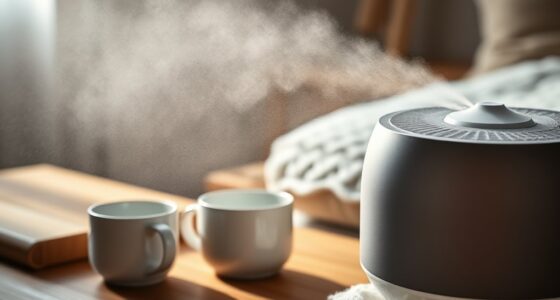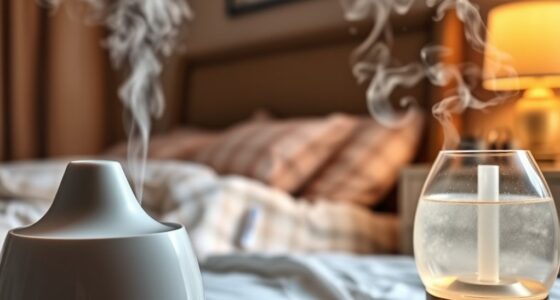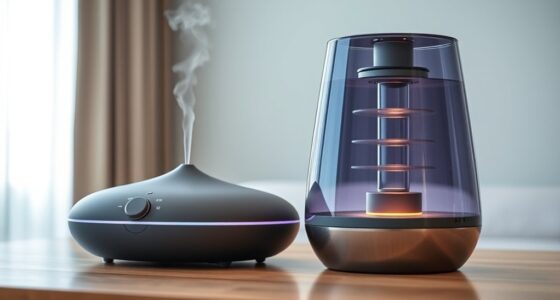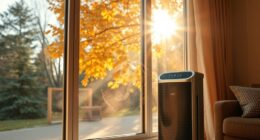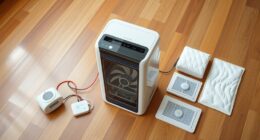Using a humidifier can help reduce your snoring by keeping your airway moist and decreasing irritation caused by dry air. When the air is properly humidified, your throat and nasal passages stay less inflamed, which may improve your breathing and lessen snoring. While not a cure on its own, combining humidifier use with other sleep habits can make a difference. Keep exploring to learn how humidity levels and other factors influence your sleep quality.
Key Takeaways
- Humidifiers add moisture to dry air, reducing airway irritation that can cause or worsen snoring.
- Maintaining humidity levels between 40-60% helps prevent airway tissues from drying out and minimizes snoring.
- Sleep studies show some individuals experience reduced snoring when using humidified air during sleep.
- Proper humidifier maintenance ensures effectiveness and prevents mold or bacteria that could worsen respiratory issues.
- Humidifiers are beneficial as part of a comprehensive sleep strategy but are not a standalone cure for snoring.
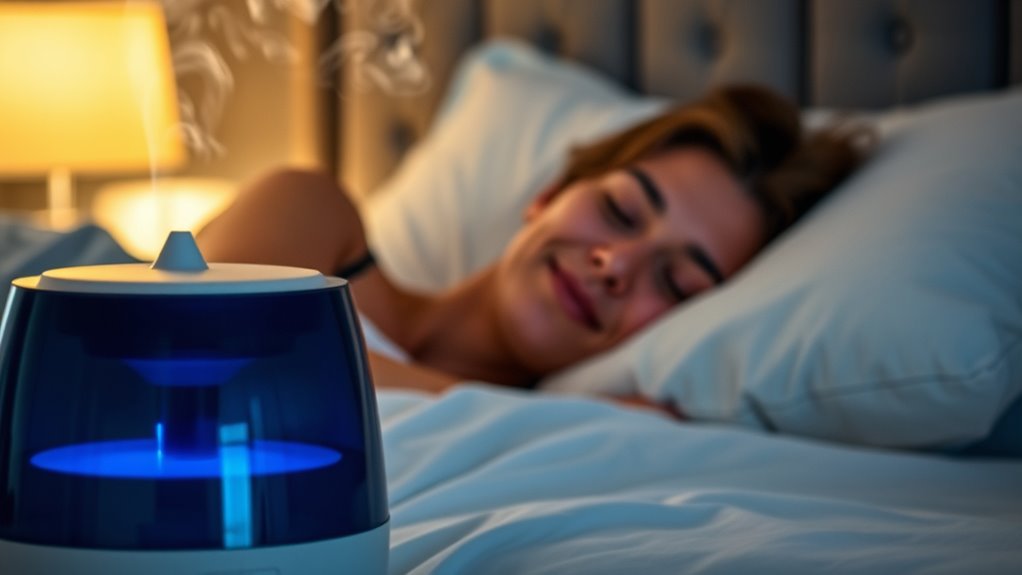
If you often wake up feeling tired despite a full night’s sleep, your snoring might be more than just an annoyance—it could be a sign of dry air irritating your airway. Dry air can cause your throat and nasal passages to become inflamed or irritated, which can lead to increased snoring. Using a humidifier can help keep the air moist, reducing irritation and potentially easing your snoring. However, for a humidifier to be effective, you need to focus on humidifier maintenance and maintaining ideal humidity levels in your bedroom. Poor maintenance, like neglecting to clean the device regularly, can lead to mold and bacteria buildup, which might worsen your respiratory issues rather than improve them. Ensuring the device is clean and functioning properly is essential for benefits like reducing snoring and improving sleep quality. Additionally, understanding the role of AI in Education can help in developing smart devices that monitor and adjust humidity levels automatically for optimal comfort.
Setting your humidifier to achieve ideal humidity levels is equally important. Experts generally recommend keeping indoor humidity between 40% and 60%. This range helps keep your nasal passages moisturized without creating excess moisture that can promote mold or dust mites. When humidity dips below 40%, your airway tissues can dry out, making snoring worse. Conversely, if humidity rises too high, it may cause congestion or promote mold growth, which can also aggravate breathing issues. You can use a hygrometer to monitor your bedroom’s humidity, ensuring it stays within the recommended range. Adjust your humidifier settings accordingly and refill it regularly to maintain consistent moisture levels throughout the night.
While a humidifier alone isn’t a guaranteed cure for snoring, it plays a significant role in creating a healthier sleep environment. It’s important to combine this with other good sleep practices, like sleeping on your side, avoiding alcohol before bed, and managing allergies that can cause nasal congestion. Sleep studies show that humidified air can improve breathing patterns for some snorers, especially those whose snoring is related to dry airway tissues. However, if your snoring persists despite using a humidifier correctly, it’s wise to consult a healthcare professional. They can determine if underlying issues such as sleep apnea are at play, which may require more targeted treatment.
Frequently Asked Questions
Can Humidifiers Cure Chronic Snoring Permanently?
A humidifier won’t cure your chronic snoring permanently, but it can help reduce symptoms. To get the best results, you need proper humidifier maintenance, like regular cleaning to prevent mold and bacteria buildup. Also, consider noise levels, as loud machines might disturb your sleep or your partner’s. While it can improve comfort and airflow, long-term snoring issues may require medical advice, not just a humidifier.
Do Humidifiers Reduce Snoring Caused by Allergies?
Ever wonder if a humidifier’s effectiveness extends to easing allergy-related snoring? You might be surprised. Humidifiers can help by adding moisture to dry air, which in turn alleviates allergy symptoms like nasal congestion and dryness. When your airways are less irritated, your snoring may reduce. So, yes, using a humidifier could bring allergy symptom relief and help you breathe easier at night, potentially lessening snoring caused by allergies.
Are There Specific Humidifier Types Best for Snoring?
You might wonder which humidifier types work best for snoring. Ultrasonic and evaporative humidifiers are popular choices because they effectively add moisture and improve your sleep environment. These types help keep your airways moist, reducing snoring caused by dry air. Choose a humidifier that suits your space and preferences, ensuring consistent humidity levels. This can make a noticeable difference in your sleep quality and help ease snoring episodes.
Can Humidifiers Improve Sleep Quality Beyond Snoring Relief?
Humidifiers can improve your sleep quality by enhancing air quality and creating a more comfortable sleep environment. When the air is properly humidified, it reduces dryness that can cause throat irritation and congestion, helping you breathe easier throughout the night. This not only benefits snoring but also prevents disturbances caused by dry air. By maintaining ideal humidity levels, you can enjoy deeper, more restful sleep and wake up feeling refreshed.
Are There Risks of Using Humidifiers for Snoring?
Thinking about using a humidifier for snoring? You should be aware of potential health risks, like mold or bacteria growth, if you neglect humidifier maintenance. Proper cleaning prevents these issues, ensuring safe, soothing sleep. Without regular upkeep, you risk respiratory irritation or infections. So, stay vigilant with maintenance, and you’ll enjoy the benefits without the dangers, making your restful nights really worth the effort.
Conclusion
So, if you’re tired of waking up to a snore symphony, a humidifier might just be your secret weapon—like having a trusty sidekick in your quest for better sleep. By keeping your air moist, you can soothe dry airways and reduce snoring. Just remember, even in these modern times, a little old-fashioned comfort can make all the difference. Sweet dreams await—no need for a knight in shining armor, just a good humidifier!



